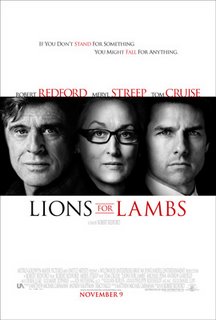
Robert Redford's
Lions For Lambs is a lot like those old "What Would You Do?" movies they used to show us in high school. They were the films that would set up a situation, then the movie would stop and ask us to discuss the situation and what we would do if we found ourselves in it. This is basically a 90 minute variation on the same idea. It sets up some different points about the War in Iraq, and then we the audience are supposed to discuss amongst ourselves afterward. The problem is, there's very little to entice here. The screenplay by Matthew Michael Carnahan (who also wrote a very different film about the very same war,
The Kingdom) is emotionally inert, and seems more suited for the stage or a classroom than the big screen. Aside from some above average performances by a strong cast, there's just nothing to grab our attention.
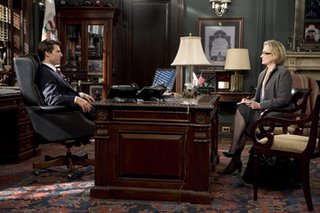
The film covers three separate storylines that all occur within the same hour. The first is set in Washington DC, and covers a television journalist named Janine Roth (Meryl Streep), who is interviewing Senator Jasper Irving (Tom Cruise) about a new military plan that will supposedly turn the tide in the war and lead us to victory. Janine realizes that Jasper is just using her to sell her and the public on the plan, and begins to question the media in general, and their responsibility in "selling" the War on Terror to the American public. In Afghanistan, U.S. soldiers Arian Finch (Derek Luke) and Ernest Rodriguez (Michael Pena) find themselves wounded and trapped behind enemy lines in a rocky, snow-filled mountain area with the enemy slowly closing in on them, and little to no chance for rescue. Finally, in California, a political science professor named Stephen Malley (Robert Redford) is having a meeting with one of his students (Andrew Garfield), who seems to have lost interest in his class and in the American government in general.
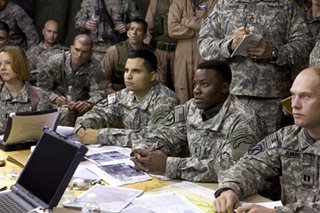 Lions For Lambs
Lions For Lambs raises a lot of good questions and a lot of good points, but doesn't know how to do so in such a way so that we don't feel like we're being talked to directly. We're not watching a movie here, we're watching a series of lectures and preaching disguised as character dialogue. This is a "talking head" picture, where the very talented cast spends a vast majority of the time sitting in chairs or at desks, and talking either to the camera or to us. It gets very distracting, especially the editing, which bounces back and forth from one character to the next like a ping pong match. Very seldom are the two characters talking in the same scene displayed in the same shot, so the camera is constantly bouncing between them. This kind of material would work as a stage play, and while watching it, I could actually envision how it could successfully be pulled off. As a movie, the dialogue is just too wordy and the action too lethargic. Characters seldom move or even change their position, to the point that it feels like we're stuck watching a lecture. As a filmmaker, Redford has proven himself many times, but here, he's stuck just pointing and shooting at the actors, seldom giving us anything to grab our attention.
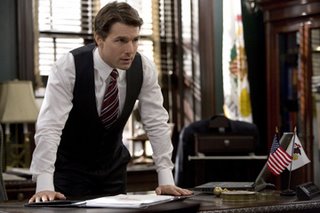
The sequences that do come the closest to creating tension and generating actual interest are the scenes set in Afghanistan. Here, the film does a good job of putting us in the middle of the action, by mainly keeping the enemies in the shadows. Their voices are heard, and we sometimes see shadowy figures darting about in the distance. It does a good job of capturing the confusion of the battlefield. The story of the two soldiers ties into the plot of the college professor, as we witness a flashback of when they were in his class and decided to enlist for the War. This leads to more politically-charged banter that is not as smart as it seems to think it is. The topics discussed by these characters have largely been discussed for years, and the movie just doesn't bring enough new to the table to warrant the audience having to listen to highly paid actors talking about it for 90 minutes non-stop. We keep on waiting for the movie to really hit hard about some topic that hasn't been talked about very openly, but they just keep on covering the same old stuff, some of which has been covered in the many other films about the Iraq War that have been released the past couple months. When the end comes, and the audience is left to discuss what they've seen, they'll find themselves talking about things they've probably talked about before.
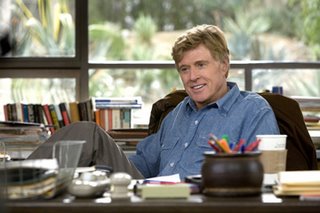
It would be a different matter if the dialogue was vibrant and varied, but everything's so scripted and rehersed here, it's hard to stay interested. It's tough to say just what audience
Lions For Lambs is supposed to be speaking to. Audience members brought in by the star-studded cast will probably be disappointed that the biggest names don't do anything except sit behind a table and debate topics that have been debated to death. Those looking for challenging or fresh questions or thoughts will not find what they're looking for. This is a message movie with a message that is easily predicted. There's just not enough life or energy in this movie to make it worth listening to all over again.
0 comments
 Robert Redford's Lions For Lambs is a lot like those old "What Would You Do?" movies they used to show us in high school. They were the films that would set up a situation, then the movie would stop and ask us to discuss the situation and what we would do if we found ourselves in it. This is basically a 90 minute variation on the same idea. It sets up some different points about the War in Iraq, and then we the audience are supposed to discuss amongst ourselves afterward. The problem is, there's very little to entice here. The screenplay by Matthew Michael Carnahan (who also wrote a very different film about the very same war, The Kingdom) is emotionally inert, and seems more suited for the stage or a classroom than the big screen. Aside from some above average performances by a strong cast, there's just nothing to grab our attention.
Robert Redford's Lions For Lambs is a lot like those old "What Would You Do?" movies they used to show us in high school. They were the films that would set up a situation, then the movie would stop and ask us to discuss the situation and what we would do if we found ourselves in it. This is basically a 90 minute variation on the same idea. It sets up some different points about the War in Iraq, and then we the audience are supposed to discuss amongst ourselves afterward. The problem is, there's very little to entice here. The screenplay by Matthew Michael Carnahan (who also wrote a very different film about the very same war, The Kingdom) is emotionally inert, and seems more suited for the stage or a classroom than the big screen. Aside from some above average performances by a strong cast, there's just nothing to grab our attention. The film covers three separate storylines that all occur within the same hour. The first is set in Washington DC, and covers a television journalist named Janine Roth (Meryl Streep), who is interviewing Senator Jasper Irving (Tom Cruise) about a new military plan that will supposedly turn the tide in the war and lead us to victory. Janine realizes that Jasper is just using her to sell her and the public on the plan, and begins to question the media in general, and their responsibility in "selling" the War on Terror to the American public. In Afghanistan, U.S. soldiers Arian Finch (Derek Luke) and Ernest Rodriguez (Michael Pena) find themselves wounded and trapped behind enemy lines in a rocky, snow-filled mountain area with the enemy slowly closing in on them, and little to no chance for rescue. Finally, in California, a political science professor named Stephen Malley (Robert Redford) is having a meeting with one of his students (Andrew Garfield), who seems to have lost interest in his class and in the American government in general.
The film covers three separate storylines that all occur within the same hour. The first is set in Washington DC, and covers a television journalist named Janine Roth (Meryl Streep), who is interviewing Senator Jasper Irving (Tom Cruise) about a new military plan that will supposedly turn the tide in the war and lead us to victory. Janine realizes that Jasper is just using her to sell her and the public on the plan, and begins to question the media in general, and their responsibility in "selling" the War on Terror to the American public. In Afghanistan, U.S. soldiers Arian Finch (Derek Luke) and Ernest Rodriguez (Michael Pena) find themselves wounded and trapped behind enemy lines in a rocky, snow-filled mountain area with the enemy slowly closing in on them, and little to no chance for rescue. Finally, in California, a political science professor named Stephen Malley (Robert Redford) is having a meeting with one of his students (Andrew Garfield), who seems to have lost interest in his class and in the American government in general. Lions For Lambs raises a lot of good questions and a lot of good points, but doesn't know how to do so in such a way so that we don't feel like we're being talked to directly. We're not watching a movie here, we're watching a series of lectures and preaching disguised as character dialogue. This is a "talking head" picture, where the very talented cast spends a vast majority of the time sitting in chairs or at desks, and talking either to the camera or to us. It gets very distracting, especially the editing, which bounces back and forth from one character to the next like a ping pong match. Very seldom are the two characters talking in the same scene displayed in the same shot, so the camera is constantly bouncing between them. This kind of material would work as a stage play, and while watching it, I could actually envision how it could successfully be pulled off. As a movie, the dialogue is just too wordy and the action too lethargic. Characters seldom move or even change their position, to the point that it feels like we're stuck watching a lecture. As a filmmaker, Redford has proven himself many times, but here, he's stuck just pointing and shooting at the actors, seldom giving us anything to grab our attention.
Lions For Lambs raises a lot of good questions and a lot of good points, but doesn't know how to do so in such a way so that we don't feel like we're being talked to directly. We're not watching a movie here, we're watching a series of lectures and preaching disguised as character dialogue. This is a "talking head" picture, where the very talented cast spends a vast majority of the time sitting in chairs or at desks, and talking either to the camera or to us. It gets very distracting, especially the editing, which bounces back and forth from one character to the next like a ping pong match. Very seldom are the two characters talking in the same scene displayed in the same shot, so the camera is constantly bouncing between them. This kind of material would work as a stage play, and while watching it, I could actually envision how it could successfully be pulled off. As a movie, the dialogue is just too wordy and the action too lethargic. Characters seldom move or even change their position, to the point that it feels like we're stuck watching a lecture. As a filmmaker, Redford has proven himself many times, but here, he's stuck just pointing and shooting at the actors, seldom giving us anything to grab our attention. The sequences that do come the closest to creating tension and generating actual interest are the scenes set in Afghanistan. Here, the film does a good job of putting us in the middle of the action, by mainly keeping the enemies in the shadows. Their voices are heard, and we sometimes see shadowy figures darting about in the distance. It does a good job of capturing the confusion of the battlefield. The story of the two soldiers ties into the plot of the college professor, as we witness a flashback of when they were in his class and decided to enlist for the War. This leads to more politically-charged banter that is not as smart as it seems to think it is. The topics discussed by these characters have largely been discussed for years, and the movie just doesn't bring enough new to the table to warrant the audience having to listen to highly paid actors talking about it for 90 minutes non-stop. We keep on waiting for the movie to really hit hard about some topic that hasn't been talked about very openly, but they just keep on covering the same old stuff, some of which has been covered in the many other films about the Iraq War that have been released the past couple months. When the end comes, and the audience is left to discuss what they've seen, they'll find themselves talking about things they've probably talked about before.
The sequences that do come the closest to creating tension and generating actual interest are the scenes set in Afghanistan. Here, the film does a good job of putting us in the middle of the action, by mainly keeping the enemies in the shadows. Their voices are heard, and we sometimes see shadowy figures darting about in the distance. It does a good job of capturing the confusion of the battlefield. The story of the two soldiers ties into the plot of the college professor, as we witness a flashback of when they were in his class and decided to enlist for the War. This leads to more politically-charged banter that is not as smart as it seems to think it is. The topics discussed by these characters have largely been discussed for years, and the movie just doesn't bring enough new to the table to warrant the audience having to listen to highly paid actors talking about it for 90 minutes non-stop. We keep on waiting for the movie to really hit hard about some topic that hasn't been talked about very openly, but they just keep on covering the same old stuff, some of which has been covered in the many other films about the Iraq War that have been released the past couple months. When the end comes, and the audience is left to discuss what they've seen, they'll find themselves talking about things they've probably talked about before. It would be a different matter if the dialogue was vibrant and varied, but everything's so scripted and rehersed here, it's hard to stay interested. It's tough to say just what audience Lions For Lambs is supposed to be speaking to. Audience members brought in by the star-studded cast will probably be disappointed that the biggest names don't do anything except sit behind a table and debate topics that have been debated to death. Those looking for challenging or fresh questions or thoughts will not find what they're looking for. This is a message movie with a message that is easily predicted. There's just not enough life or energy in this movie to make it worth listening to all over again.
It would be a different matter if the dialogue was vibrant and varied, but everything's so scripted and rehersed here, it's hard to stay interested. It's tough to say just what audience Lions For Lambs is supposed to be speaking to. Audience members brought in by the star-studded cast will probably be disappointed that the biggest names don't do anything except sit behind a table and debate topics that have been debated to death. Those looking for challenging or fresh questions or thoughts will not find what they're looking for. This is a message movie with a message that is easily predicted. There's just not enough life or energy in this movie to make it worth listening to all over again.






0 Comments:
Post a Comment
<< Home